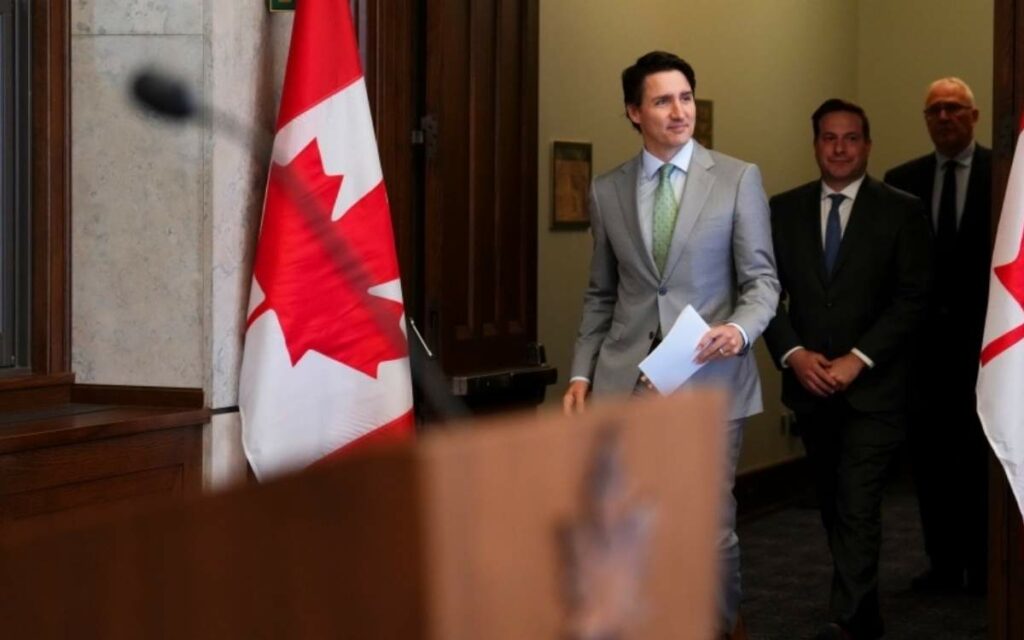
The decision to accept David Johnston’s recommendation has not only been widely condemned, but it’s also managed to align the interests of the Conservatives, NDP and Bloc Quebecois in a rare show of solidarity. Photo credit: The Canadian Press/Sean Kilpatrick
It’s been nearly two years since Justin Trudeau won his way to a second minority government, and most public opinion polling in recent months shows that change could soon be on the horizon.
The fact of the matter is that elections rarely boil down to who has the best platform, and instead tend to be based on a series of values statements that motivate Canadians enough to get them out to the voting booth on election day. From the economy to managing public safety, the Conservative Party is increasingly seen as the party most trusted to handle the problems that are shaping up to define the ballot box question in the next federal election.
In some ways, Trudeau is facing many of the same issues in his tenure as Prime Minister that crippled his predecessor. During his last years on the job, former Prime Minister Stephen Harper spent more time responding to questions about an illicit $90,000 personal cheque from his chief of staff to former Senator Mike Duffy than talking about how his government balanced the federal budget. This wasn’t due to a lack of trying – it’s just that the narrative got away from the Conservatives and legacy issues like cuts to public service jobs, the senate scandal, and a hardline stance on immigration resonated more with voters than did the state of the economy.
Nothing Harper said or did in the summer of 2015 could stifle the perception of a tired and out-of-touch party that had lost its finger on the pulse of Canadians.
Fast forward to the conversations happening this week. Much of the national news coverage has been dominated by special rapporteur David Johnston’s report on Chinese foreign interference that recommended the Trudeau government not move forward on an independent, public inquiry. The decision to accept Johnston’s recommendation has not only been widely condemned, but it’s also managed to align the interests of the Conservatives, NDP and Bloc Quebecois in a rare show of solidarity.
As has been the case since late January, the issue of foreign interference is set to dominate the House of Commons agenda heading into the June summer recess, with no end in sight if Trudeau continues to dodge calls for a public inquiry. Even though the Trudeau government has managed to reach a national healthcare agreement, revise the Safe Third Country Agreement with the United States, and provide millions of dollars of support to Ukraine, these accomplishments have been completely overshadowed by the government’s inadequate response to the foreign interference scandal.
They say governments usually defeat themselves in the end. For anyone paying attention to the interference issue, it is a slow-moving wave that continues to rip through Ottawa and feels eerily similar to the Mike Duffy Affair of 2013.
From this vantage point, it seems the Trudeau government has a decision to make: call a public inquiry in the hopes it stops the bleeding enough to regain the narrative over the course of the summer, or keep kicking the can down the road and try and avoid the same fate as Harper experienced in 2015. Either way, the Prime Minister has his work cut out for him if he hopes to win the next election.

Josie Sabatino is a Senior Consultant at Summa Strategies, focused on providing strategic insight and helping clients meet their objectives in an ever changing and complex political and regulatory environment. Prior to joining Summa, Josie spent nearly a decade in political communications and most recently served as the Director of Communications to the Hon. Erin O’Toole, former Leader of the Official Opposition.




















